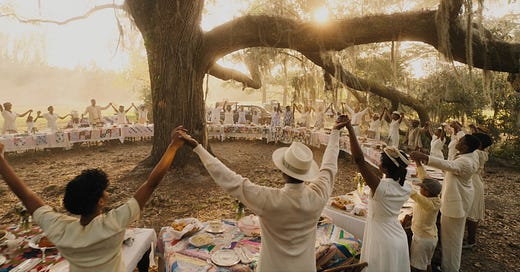THB #453: The Color Purple
It’s really hard to review the new film musical version of The Color Purple because it isn’t really The Color Purple as we have known it. The studio acknowledges as much in marketing, almost always calling it a “reimagining” or “a bold new take.” And that is what it is.
Blitz Bazawule, the director and conceptual mind behind this The Color Purple, has made something quite similar to the Black is King long-form music video event from Beyoncé, of which he was “involved” in the direction. (The language around this, like other things in the publicity for this movie is odd… but I am quoting as best as I can and trying not to shortcut or undervalue.)
Having seen the film 4 times now, twice with very excited audiences, I continue to feel like this is a movie for people who already know and love the source material and that the film is less a full-throated telling of the story than a celebration of it.
It is certainly a full production with high production values, but the narrative experience reminded me of the staged readings/singing like Encores in New York or the many Sondheim events when there were great casts in tuxedos, different but already beloved stars singing songs we already loved.
A big difference is that The Color Purple comes to the table with only two familiar songs for audiences who didn’t see the Broadway show - God Is Trying To Tell You Something and Miss Celie’s Blues (Sister) - which are in the Spielberg movie. But most of the 17 song soundtrack combines songs from the Broadway show and new songs by the same songwriters.
So, for instance, the new movie opens, like the show, after establishing the sisters together, with Mysterious Ways, a rousing gospel number led by Tamela Mann, who brings down the house (no official image available). But as an outsider to the show and the song, I was left trying to figure out how this had anything to do with the story of Celie.
The honest answer is, it doesn’t. It establishes the church in this town and the reverend, who will turn out to be Shug Avery’s father. But The Church is not an active player in Celie’s story. And if you really think about it, The Church is a villain, in that it does absolutely nothing to keep Celie from being repeatedly raped and impregnated by her father, Alfonso, or being sold off to Mister or from Celie’s sister Nettie being driven out of town by Mister and Alfonso. The local white postman is more engaged with Mister and his bad behaviors than Reverend Avery.
But that doesn’t make the big musical number any less engaging.
Keep reading with a 7-day free trial
Subscribe to The Hot Button by David Poland to keep reading this post and get 7 days of free access to the full post archives.




